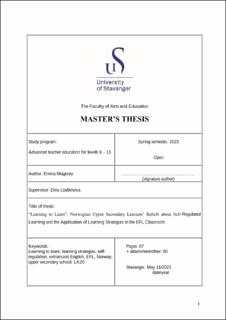| dc.description.abstract | This thesis is a study of English as a Foreign Language (EFL) learners’ beliefs about self-regulated learning (SRL) and the application of learning strategies in the Norwegian upper secondary EFL classroom. The main aim of the study was to investigate if the EFL learners in Norwegian upper secondary school believed that they learned how to learn in the English subject and if they found learning strategies useful in becoming self-regulated learners in the EFL classroom. Additionally, it aimed at exploring the contribution that extramural English (EE) learning could provide learners in terms of SRL. Thus, the study aimed to answer the following research questions:
1. What are the Norwegian upper secondary pupils’ beliefs about the use of learning strategies in the EFL classroom?
2. Do the Norwegian upper secondary pupils view themselves as self-regulated learners?
3. Are the Norwegian upper secondary pupils aware of their own learning process and how they learn best in the English subject?
4. Is there any relationship between the pupils who view themselves as self-regulated learners in the EFL classroom and the pupils who are regularly involved in extramural English activities?
In order to answer the above questions, the study used a mixed methods approach, namely a questionnaire answered by 134 Norwegian upper secondary pupils, followed up by individual interviews with four Norwegian upper secondary pupils.
The main findings indicated that while some EFL learners believed in the usefulness of learning strategies in the English subject, not all were aware of the specific strategies taught or used. This highlighted a need for clearer emphasis on the teaching of learning strategies in the EFL classroom. The study also revealed that a significant number of the EFL learners viewed themselves as self-regulated learners and recognized the importance of SRL in the English subject. The findings also suggested that promoting self-regulation in the EFL classroom could help learners become more autonomous, develop effective learning strategies, and take greater ownership of their learning process. Lastly, the study examined a potential relationship between self-regulation in the EFL classroom and participation in EE activities. While the participants did not explicitly confirm a clear relationship between the above, the interviews revealed that those who were self-regulated learners spent more time on EE activities. The findings suggest that EE learning could contribute to the pupils’ learning the language and improving their proficiency, in addition to the promotion of SRL and the use of learning strategies. Overall, this thesis has contributed to the deeper understanding of Norwegian upper secondary EFL learners’ beliefs about self-regulated learning and their use of learning strategies in the EFL classroom. It has also provided important implications for Norwegian EFL teachers. | |
